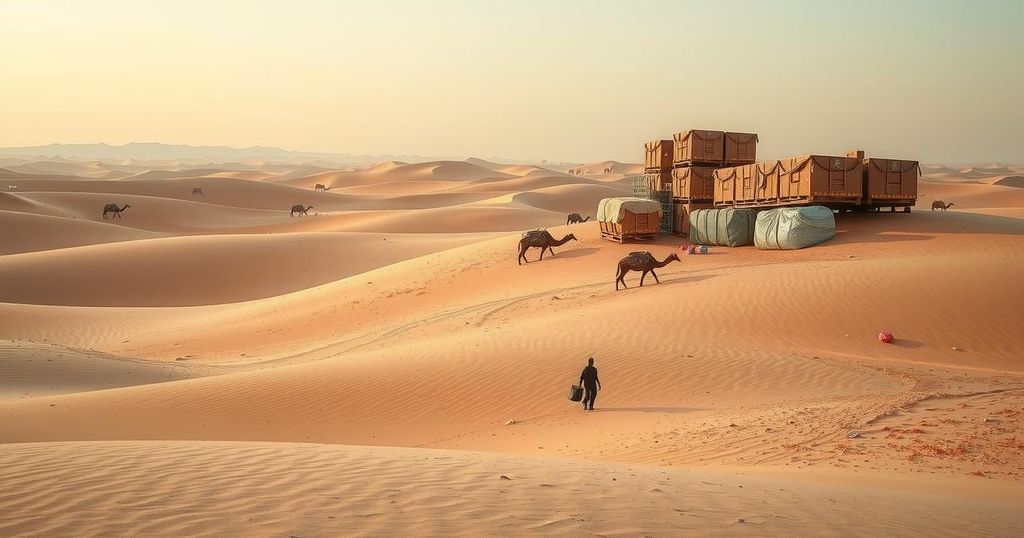Sudan has accused the UAE of complicity in genocide amid its civil war, alleging support for the RSF. The UAE denies these accusations, emphasizing its strategic interests in Sudan’s resources. The International Court of Justice is now addressing Sudan’s claims, garnering attention on the UAE’s involvement in the region’s conflicts.
Sudan has lodged a formal complaint against the United Arab Emirates (UAE) at the International Court of Justice, accusing it of complicity in genocide amid the ongoing civil war. This accusation highlights the UAE’s alleged support for the Rapid Support Forces (RSF) in their conflict with the Sudanese army, an allegation that the UAE has officially denied.
Sudan is a country of significant importance, rich in natural resources such as agricultural land, gas, and gold. It ranks as Africa’s third-largest producer of gold and shares a border with Libya, where the UAE has been backing opposing political factions. Additionally, Sudan’s coastline along the Red Sea serves as a critical route for oil transport, further accentuating its strategic value to the UAE.
The UAE is primarily motivated by a desire for political influence within Sudan, a country regarded as vital for regional dynamics. Emirati firms view Sudan as a key investment location, particularly in resource extraction and trade. Furthermore, the UAE’s interest can be attributed to a need for resources unavailable in its own desert landscape, including essential minerals and arable land.
Research indicates a trend of UAE involvement across Africa, often collaborating with paramilitary groups to exploit natural resources. Recent reports suggest that a large percentage of African gold exported to the UAE was reported to be smuggled, with the UAE emerging as the largest international purchaser of Sudanese gold, predominantly controlled by the RSF.
While gold remains a significant interest, scholars suggest that the UAE’s motives are broader, including countering Saudi Arabian influence in Sudan and combating political Islam, which poses a perceived threat to UAE security. This complex web of motivations underscores the multifaceted relationship between the UAE and the RSF.
The UAE’s relationship with Sudan’s military originated from cooperative efforts during the Yemeni civil war, where Sudan deployed troops under Saudi command. However, tensions have arisen between the UAE and Saudi Arabia, particularly as Emirati support for the RSF appears to challenge Saudi objectives. The RSF’s alignment against the Muslim Brotherhood aligns ideologically with the UAE’s stance on political Islam.
Both the army and the RSF have faced accusations of war crimes amid this brutal conflict, which has resulted in extensive human suffering. The United States has labeled actions by the RSF as genocide, echoing concerns regarding ethnic targeting during the conflict. Additionally, U.S. lawmakers have alleged the UAE has failed in its commitments to cease military support to the RSF.
Sudan’s case against the UAE at the International Court of Justice charges the Emirati state with genocide complicity. The UAE has condemned the suit, characterizing it as a mere publicity stunt. Although ICJ judgments are legally binding, their enforcement remains problematic, leading experts to believe that while the case may damage the UAE’s global standing, its financial leverage will likely prevent substantial consequences.
In summary, Sudan’s allegations against the UAE of complicity in genocide highlight the complex dynamics in the region, particularly concerning the UAE’s support for the RSF amid a brutal civil conflict. The strategic importance of Sudan, its rich natural resources, and the multifaceted geopolitical interests of the UAE contribute to this intricate situation. While the UAE denies these allegations, the ongoing court case may impact its international reputation, although its political and financial resilience could mitigate significant repercussions.
Original Source: www.ndtv.com






